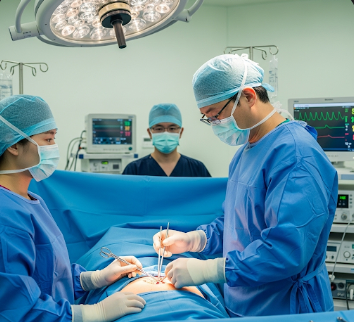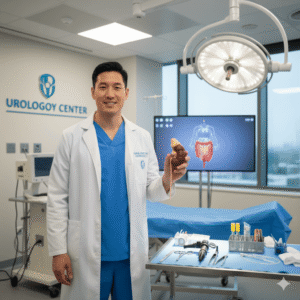Overview
Appendectomy is a surgical procedure to remove the appendix, a small, finger-shaped pouch attached to the large intestine. This surgery is most commonly performed to treat appendicitis, which is an inflammation or infection of the appendix. If left untreated, appendicitis can lead to rupture, severe infection, and life-threatening complications.
In Korea, appendectomy is performed in state-of-the-art hospitals using minimally invasive laparoscopic techniques or, in some cases, open surgery. Korean surgeons emphasize precision, patient safety, and rapid recovery, making Korea a preferred destination for both domestic and international patients requiring emergency or elective appendectomy.
What is Appendectomy?
An appendectomy is the surgical removal of the appendix. It can be performed using:
- Laparoscopic Appendectomy: Minimally invasive approach using small incisions and a camera; most common method today
- Open Appendectomy: Traditional surgery using a single larger incision in the lower right abdomen; used in complex cases or ruptured appendicitis
The goal of appendectomy is to eliminate the source of infection, prevent rupture, and restore abdominal health.
What are the benefits?
- Prevents life-threatening complications from ruptured appendix
- Eliminates infection and inflammation quickly
- Minimally invasive laparoscopic technique reduces pain, scarring, and hospital stay
- ✅ Rapid recovery with most patients returning to normal activities within 1–2 weeks
- ✅ High success rate with low risk of complications in Korean hospitals
- ✅ Advanced surgical tools and expert surgeons ensure precision and safety
Procedure Details
1) How should I prepare for an Appendectomy?
- ➤ Medical evaluation, including blood tests, imaging (ultrasound or CT scan), and vital signs
- ➤ Fasting for several hours before surgery, typically 6–8 hours
- ➤ Discuss medications with your surgeon, especially blood thinners
- ➤ Consent and preoperative counseling on surgery, anesthesia, and recovery
- ➤ Arrange post-surgery care for assistance at home if needed
2) What happens during the procedure Appendectomy?
- ✅ Performed under general anesthesia
- ✅ Laparoscopic appendectomy: Small incisions are made, and a camera and surgical instruments are inserted to remove the appendix
- ✅ Open appendectomy: A single incision is made in the lower right abdomen to access and remove the appendix
- ✅ The surgeon closes the incisions with sutures or surgical staples
- ✅ Surgery usually takes 30–60 minutes, depending on complexity and appendix condition
3) What happens after an Appendectomy?
- ➤ Patients are monitored in the post-anesthesia care unit for vital signs and complications
- ➤ Pain management and antibiotics are administered as needed
- ➤ Patients can usually resume light activities within a few days
- ➤ Diet is gradually resumed, starting with liquids and soft foods
- ➤ Full recovery usually occurs within 1–3 weeks, though complex cases may take longer
Risks / Benefits
Potential Risks:
- ➤ Infection at the incision site or inside the abdomen
- ➤ Bleeding or hematoma formation
- ➤ Injury to surrounding organs
- ➤ Blood clots
- ➤ Rare complications such as bowel obstruction
Benefits:
- ✅ Eliminates inflamed or infected appendix, preventing rupture
- ✅ Resolves pain and digestive discomfort caused by appendicitis
- ✅ Minimally invasive surgery ensures smaller scars and faster recovery
- ✅ High success rates in Korea due to experienced surgeons and modern surgical techniques
- ✅ Reduces risk of long-term complications
Recovery and Outlook
- Hospital stay: Typically 1–2 days for laparoscopic appendectomy; longer if complications occur
- Activity: Light activity can resume within a few days; avoid heavy lifting for 2–4 weeks
- Wound care: Keep incisions clean and dry; monitor for signs of infection
- Follow-up: Usually 1–2 weeks after surgery to check healing
- Most patients experience complete recovery, with return to normal life and activities within 1–3 weeks
- Post-surgery, patients are advised to maintain a healthy diet and monitor for any abdominal discomfort
When To Call the Doctor
- ➤ Fever or signs of infection at incision sites
- ➤ Severe or worsening abdominal pain
- ➤ Persistent vomiting or inability to eat
- ➤ Swelling, redness, or discharge from incisions
- ➤ Unusual bleeding or changes in bowel habits
Best Korea Option / Process
- ✅ Korea provides world-class appendectomy services with both laparoscopic and open techniques
- ✅ Hospitals in Seoul, Busan, and Incheon offer advanced operating theaters and experienced surgeons
- ✅ Rapid preoperative evaluation allows prompt surgery, reducing risk of rupture
- ✅ International patients benefit from VIP services, English-speaking coordinators, and post-operative monitoring
- ✅ Minimally invasive laparoscopic appendectomy ensures fast recovery, minimal scarring, and excellent outcomes
- ✅ Comprehensive care includes surgery, hospitalization, and follow-up, ensuring patient safety and comfort













